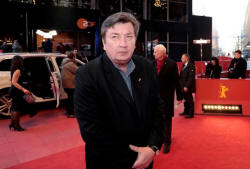|
 Syrian
films bring tears and smiles to Berlin Film Festival Syrian
films bring tears and smiles to Berlin Film Festival
 Send a link to a friend
Send a link to a friend
[February 15, 2017]
By Joseph Nasr
BERLIN (Reuters) - One
drops you, trapped and powerless, in the middle of a
civil war, while the other uses humor to depict what's
it like to start a new life in Europe after escaping the
same conflict.
|
|
 "Insyriated" and "The Other Side of Hope" are two films about
Syria, and they brought tears and smiles to the Berlin Film
Festival. "Insyriated" and "The Other Side of Hope" are two films about
Syria, and they brought tears and smiles to the Berlin Film
Festival.
The former is shot almost entirely inside the walls of an
apartment that becomes like a prison for Oum Yazan, a mother
determined to survive a war whose brutality is conveyed mostly
through the sounds of bombs and sniper gunfire.
"It shocked people in a very smart way. Westerners saw enough
images of destruction on their television screens. But few of
them know what Syrians are going through or how they feel being
trapped in there," Iraqi film critic Kais Kasim said.
The film forces viewers to ask themselves how they would act in
the same situation.

Belgian director Philippe Van Leeuw said the silence that
followed the screening as well as seeing some of his actors and
members of the audience in tears at the end made him think:
"Mission accomplished."
"It is hard for me to say I was happy when I saw the film for
the first time with the audience," said actress Hiam Abbass, who
plays Oum Yazan.
"It brought people close to the Syrian people," she said, adding
that she had no idea the film would leave people speechless.
[to top of second column] |

"The Other Side of Hope" by Finnish director Aki Kaurismaki uses
humor to depicts the experiences in Helsinki of stowaway Syrian
asylum seeker Khaled, who decides to remain in the country illegally
after his application is rejected.
His fate is to meet the main character in the second story of the
film, Finnish salesman Wikstrom, who buys a restaurant in the
capital where he gives Khaled a job and a bed.
Wikstrom and the other Finns in the film are burlesque characters,
the source of most of the light-hearted humor that almost obscures
Khaled's ordeal: most of his family died in a bomb in Aleppo and he
lost his sister shortly after they arrived in Europe from Turkey.
"It uses comedy to convey tragedy," said film critic Kasim. "It
blends the critical with the caricature, leaving people with the
question: do we laugh or do we cry?"
(editing by John Stonestreet)
[© 2017 Thomson Reuters. All rights
reserved.] Copyright 2017 Reuters. All rights reserved. This material may not be published,
broadcast, rewritten or redistributed. |